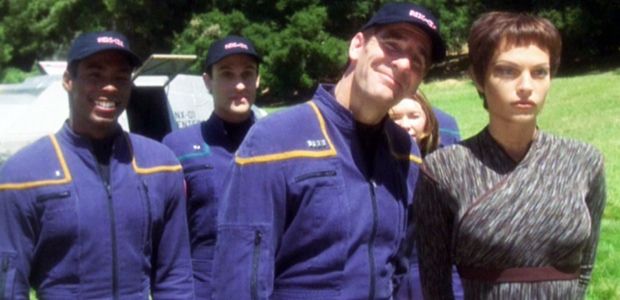"Strange New World," the third Enterprise episode, finally answered a question I've had about Star Trek since The Next Generation, if not before. Is that enough to make up for one of the more obvious plot developments in any Trek - not to mention a repeat of one of the biggest mistakes that TNG made in its earliest days?
Overall, "Strange New World" is a perfectly fine episode; there's nothing particularly terrible about it, and - as with the first two episodes of the series - there are character moments that are particularly charming (The excitement displayed by the shuttle crew, with the obvious exception of T'Pol of course, at wandering around the beautiful planet after spending so long onboard the Enterprise is something that feels particularly genuine and believable; unlike the crews of earlier/later Treks, this would be the longest any of these characters had spent in space without break, after all), which goes a long way as far as I'm concerned. Technically, too, the "threat" of the episode makes sense, and the throughline works perfectly well even if we're missing a particularly exciting climax. So why did it seem so unsatisfying?
Well, there's the fact that the plot repeats the mistake at the core of "The Naked Now," the second episode of Star Trek: The Next Generation. No, it's not "let's repeat a much-beloved episode of the original series almost beat-for-beat," but "let's hinge a story on our cast acting out of character so early in the series run that the audience doesn't even really know what's in character for most of them." Just as "The Naked Now" was based around the idea that "something is wrong because people aren't acting right," so "Strange New World" expects the viewer to realize that (a) Tucker isn't a xenophobic ass normally, and (b) the Enterprise crew is usually above such things as paranoia when it's not being affected by hallucinogenic pollen floating around in the air.
As it is, the viewer probably does realize those things, but not for the right reasons; there's been enough hints that Tucker is a bit of a bigot when it comes to aliens in previous episodes that it would be perfectly believable if we could just go on what's been said in the story, but because we have the meta-awareness of how Trek characters are "supposed" to act, we know something's up. Same with the other crew members. To my mind, this just underscores the problem with the episode: We know something is happening not because of what's in the story, but because we've watched enough Star Trek in general that we expect the leads to be more evolved; doesn't that make the episode faulty, if it has to rely on what we're bringing to it from elsewhere?
But despite that, it's not a bad episode, as I said earlier; it's watchable, and there are enough moments of "Huh, that's fun" to keep you going throughout the entire thing. Yes, the premise is flawed, and the execution follows in that direction for the main plot, but it's all done with such a professionalism that you keep going nonetheless. A sign of things to come…? We'll see. For now, it's just an off episode after two stronger ones, and I retain some hope that things will get back to the level of the earlier eps as the show continues, but we'll see…
(And as to the nagging question that was finally answered…? Thanks to this episode, I finally found out that, when Starfleet crews call planets "M class," the "M" apparently stands for "Minshara," seemingly a Vulcan classification meaning one that could support human life. Finally!)

